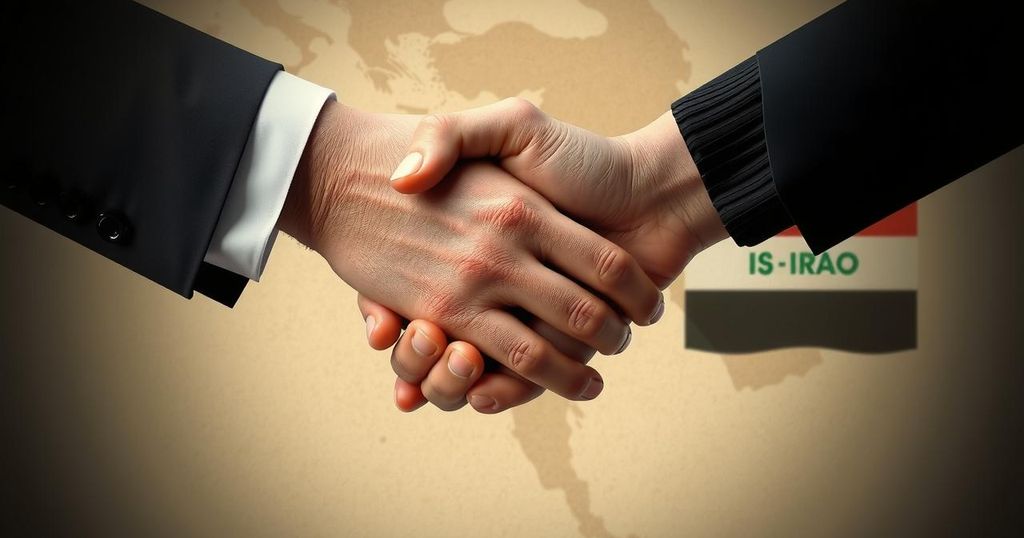Syria aims to restore its trade with Iraq but faces obstacles due to Baghdad’s political hesitance. Despite meeting border and customs requirements, Iraq delays reopening trade channels, citing concerns over Syria’s stability. While limited exchanges persist, trade volume remains significantly lower compared to pre-war levels. The lack of banking cooperation forces traders into the black market, raising costs and limiting economic activity between the two nations.
Syria is working to revive its once-thriving trade relationship with Iraq, yet political uncertainty in Baghdad hampers progress. Although Syria has met key security and customs requirements, Iraq remains cautious about reopening trade fully. Ibrahim Shalash from the Syria-Iraq Business Council remarked on the readiness of Syrian officials and businesses to facilitate border crossings but indicated that Iraq has not yet permitted this renewed engagement.
Iraq’s concerns about Syria’s political stability hinder any potential formal trade agreements. The lack of official banking channels and restrictive economic policies exacerbate the situation, making robust economic cooperation challenging. However, there are ongoing limited transactions, with Iraq exporting goods such as dates and industrial products, while Syria supplies sweets, cosmetics, and medical supplies. This unofficial trade represents only a fraction of prior volumes.
Shalash further noted that Syrian exporters face significant challenges due to sanctions like the Caesar Act, which, despite being eased, continue to impact trade with Iraq. The absence of banking cooperation forces businesses to resort to the black market, disrupting normal economic processes. Syria used to rely on Iraq for a significant percentage of its exports across key sectors before the conflict.
Historically, trade ties between Syria and Iraq have fluctuated due to political developments, with periods of cooperation disrupted by conflicts, such as the U.S. invasion of Iraq in 2003. Even during turbulence, limited engagement continued, especially as Iraq recognized security ties with Syria were critical to its own stability. As the situation evolved, new governance structures in Iraq resulted in further uncertainties regarding trade relations.
Despite claims of readiness from Syrian officials to resume extensive trade, Iraq maintains a cautious stance. Shalash expressed frustration over the persistent barriers, emphasizing Syrian industries’ strength and their contribution to regional economies. Iraqi officials have reiterated that formal trade will only commence with Syria’s stabilization and substantial security assurances for cross-border transactions.
Pharmaceutical trade—a significant sector—has been particularly affected. The Iraqi Ministry of Health’s recent decision to block new Syrian pharmaceutical companies’ registrations highlights ongoing trade limitations. Although many Syrian plants are operational in Iraq, new establishments still require approval, further complicating trade dynamics.
Syria sees Iraq as essential for economic recovery, with ambitions to restore trade levels prior to the conflict. As efforts to bolster their border infrastructure progress, Iraqi preparations remain conditional on specific security agreements with Syrian authorities. Current limited trade illustrates underlying economic interdependencies, but the overall outlook remains tenuous as both nations navigate toward potential cooperation.
Despite the existing challenges, economic necessity compels continued engagement. As Syria strives for recovery, the collaboration landscape remains uncertain, primarily awaiting Iraq’s decisions regarding trade agreement reforms and facilitation. The question persists: will Iraq finally ease its restrictions or sustain the impasse?
In conclusion, the trade relationship between Syria and Iraq is hindered by political hesitations and fears around stability. Despite Syria’s readiness and the existence of limited trade, the absence of robust banking cooperation further complicates economic interactions. The historical fluctuations in their trade ties underscore the necessity for both nations to find common ground. As Syria seeks to revive its economy, Iraq’s cautious approach continues to pose significant challenges to this vital partnership.
Original Source: shafaq.com






